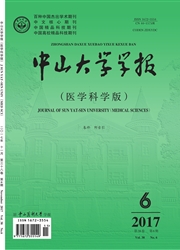

 中文摘要:
中文摘要:
目的:探讨非选择性环氧合酶抑制剂吲哚美辛诱导胃癌细胞凋亡作用与Akt/GSK3β/NAG-1信号通路的关系。方法:MTT法测定胃癌细胞的活力;Hoechst 33258染色检测细胞形态学改变,流式细胞术检测DNA含量的变化,Western blotting检测蛋白表达的变化。结果:吲哚美辛通过caspase通路诱导胃癌细胞MGC-803的凋亡,明显降低Akt和GSK3β的磷酸化水平,同时上调NAG-1的表达。单独抑制PβK或Akt的活性亦可上调NAG-1的表达,而GSK3抑制剂预处理后则取消吲哚美辛上调NAG-1表达的作用。结论:吲哚美辛可通过Akt/GSK3β/NAG-1信号通路诱导胃癌细胞MGC-803的凋亡。
 英文摘要:
英文摘要:
AIM: To investigate whether indomethacin induces gastric cancer cell apeptosis through Akt/ GSK3β/NAG- 1 pathway. METHODS: Gastric cancer cell line MGC- 803 was used in the study. Cell viability was measured by MTT method. Hoechst 33258 nuclear staining and flow cytometry analysis were used to determine apeptosis. The protein expression level was examined by Western blotting. RESULTS: Indomethaein induced MGC -803 cell apeptosis via caspase - dependent pathway. Indomethacin inhibited Sef,473 - Akt and Set9 - GSK3β phosphorylation and up - regulated the expression of non - steroidal anti - inflammatory drug - activated gene - 1 ( NAG - 1 ). Inhibition of PI3K or Akt alone also increased NAG - 1 expression. Moreover, the effect of indomethacin on NAG - 1 expression was abolished by pretreatment of the cells with GSK3β inhibitor SB216763. CONCLUSION: Indomethacin induces gastric cancer call apeptosis through Akt/GSK3β/NAG- 1 pathway.
 同期刊论文项目
同期刊论文项目
 同项目期刊论文
同项目期刊论文
 Static Pressure Promotes Rat Aortic Smooth Muscle Cell Proliferation via Upregulation of Volume-Regu
Static Pressure Promotes Rat Aortic Smooth Muscle Cell Proliferation via Upregulation of Volume-Regu Interleukin-1beta induces long-term potentiation of C-fiber evoked field potentials in spinal dorsal
Interleukin-1beta induces long-term potentiation of C-fiber evoked field potentials in spinal dorsal TNF-α enhances the currents of voltage gated sodium channels in uninjured dorsal root ganglion neuro
TNF-α enhances the currents of voltage gated sodium channels in uninjured dorsal root ganglion neuro 期刊信息
期刊信息
